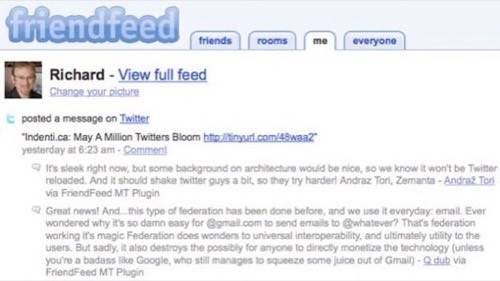2008 has seen a big change in the way the blogging community communicates with each other. In a nutshell, discussions have become very fragmented. There are two main reasons for this: firstly Twitter and its 140 character soundbites has become very popular among bloggers, and secondly FriendFeed has tipped as the lifestreaming aggregator of choice for many people. The upshot is that there are now many places where people can have online discussions. This has been a challenge to blog publishers, for whom comments are an integral part of the blogging experience.

Over the past few months, the ReadWriteWeb team has been discussing internally how to adapt to this. We’ve discussed whether to use services such as Disqus, YackTrack and SezWho, which enable people to track, organize and rate blog comments. However our conclusion was that those types of apps are unsuitable for a large multi-author blog like ReadWriteWeb – there are question marks over ability to handle the load, what happens if the service goes down, SEO, and other issues. And to be frank, personally I haven’t found the user experience of any of those apps to be very compelling (we’ve tested one of them on RWW before).
FriendFeed Comments
So we got to discussing how to utilize FriendFeed and/or Twitter in ReadWriteWeb. To make a long story short, ReadWriteWeb recently implemented a new Movable Type plug-in called FriendFeed Comments. The plug-in was developed by Mark Carey and it enables FriendFeed comments to show up on ReadWriteWeb posts as comments – and vice versa! Note that there is a similar WordPress plug-in, developed by Glenn Slaven.
Full disclosure, Mark Carey is a Technical Consultant for ReadWriteWeb. But he also runs his own business, which includes developing Movable Type plug-ins. So ReadWriteWeb was the first blog to test FriendFeed Comments out. As Mark explains, it “enables you to import and display comments made using FriendFeed on your entries. You can also use the plugin to enable your blog commenter to “Cc.” their comments to FriendFeed (if they have a FriendFeed account).”
Here is an illustration of how it works:
People commenting in FriendFeed about our post profiling Identi.ca

The FriendFeed comments show up on the RWW post

To send comments from RWW into FriendFeed, simply click the ‘cc’ link

What I love about the MT and WordPress FriendFeed plug-ins is that they recognize the fact that conversations are occurring elsewhere, but they bring the discussion back to the source of the content where relevant. It’s win-win as far as I can see.
And Now Please Fix Trackbacks…
Six Apart’s David Recorden implied in a post that the FriendFeed plug-in operates in a similar way to Trackback [update: David clarifies in a comment that he didn’t mean from a technical perspective, “but rather that the idea of bridging conversations around the web is very similar.”].
On that point, RWW has had a lot of issues with trackback. During our discussions internally about the plug-in, we also considered if it could somehow be adapted to replace or augment trackbacks. Because frankly trackbacks don’t work for us. We are one of the most linked-to blogs in the world, yet we get just a trickle of trackbacks. So if there is a way to integrate link-backs into ReadWriteWeb as easily as the FriendFeed plug-in integrates outside discussion, then I’d be one very happy publisher! Consider that a challenge to the plug-in developers out there 😉
What are your thoughts on the state of distrubuted discussions in the blogosphere? And how can we give trackback the same makeover that blog comments has gotten in 2008?

















